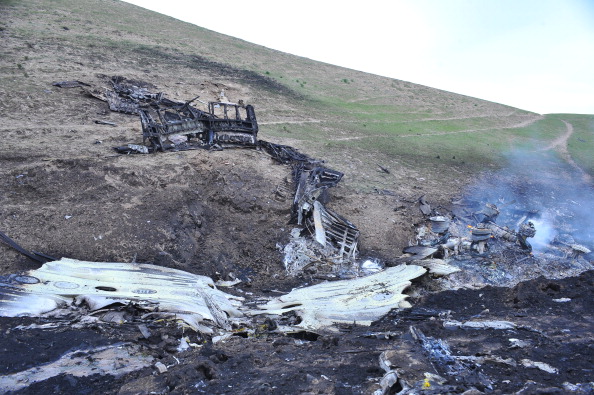SPOKANE, Wash. -- The U.S. Air Force Thursday released the cause of a KC-135 crash last year that killed three Fairchild airmen in Kyrgyzstan. An official said several factors contributed to the crash but if the crew had taken proper action, they could have prevented it.
The USAF crash report was 1500 pages. Air Force officials said they had spoken with the family of the airmen about the investigation.
Capt. Mark T. Voss, 27, of Colorado Springs, Colo., Capt. Victoria A. Pinckney, 27, of Palmdale, Calif., and Tech Sgt. Herman Mackey III, 30, of Bakersfield, Calif. died while supporting Operation Enduring Freedom near Chon-Aryk, Kyrgyzstan May 3, 2013. The airmen were assigned to the 93rd Air Refueling Squadron, Fairchild Air Force Base, Wash.
The crash report detailed that upon take-off at 2:37 p.m. from Manas Transit Center, the crew stated the plane was 'kind of waffling.' A crew-member also said the plane was getting 'difficult to fly.' The oscillations continued to grow, the report stated. Those flight control malfunctions that began on take-off reportedly caused 'lateral control instability' which led to an aircraft motion called a 'Dutch roll,' which consists of a combination of 'tail-wagging' and rocking from side to side. Officials said the crew attempted to stabilize the plane using manual controls. They also used the autopilot twice, which intensified the erratic movements. Reports also said the way they manipulated the rudder made the problem worse.
The Dutch roll exceeded the structural design of the KC-135, investigators said Thursday. The tail section fell off the plane and the aircraft entered a dive and exploded. The plane crashed approx. 11 minutes after take-off.
'There were portions with which the crew had they took the proper actions most likely would have prevented this outcome,' said Brig. Gen. Steven Arquiette of the U.S. Air Force.
According to the investigation, the crew's training on the Dutch roll was insufficient and the simulator was incapable of realistically training for such a situation.
In response to the report's findings, Air Force officials announced Thursday safety improvements were already underway. Those included changes to training regarding Dutch Roll recognition and recovery. Maintenance tracking of flight control malfunctions had also been increased.
Residents of the rural, sheep-herding region where the crash took place described hearing the plane explode in the air and seeing it break apart as it fell.
'I heard a very loud explosion,' Emil Bokochev, a member of the village council, told an AP reporter at the site. 'Literally six or seven seconds afterward there was another explosion and the plane broke apart into four or five pieces and at that moment we thought it was going to fall on the village Chaldovar.'
Parts of the plane were scattered across a wide area near the village of Chaldovar. Some pieces, including the tail, came down in a grassy valley bordered by steep mountains.
The plane was on a refueling mission for Afghanistan war operations at the time of the crash, a U.S. defense official in Washington said.


